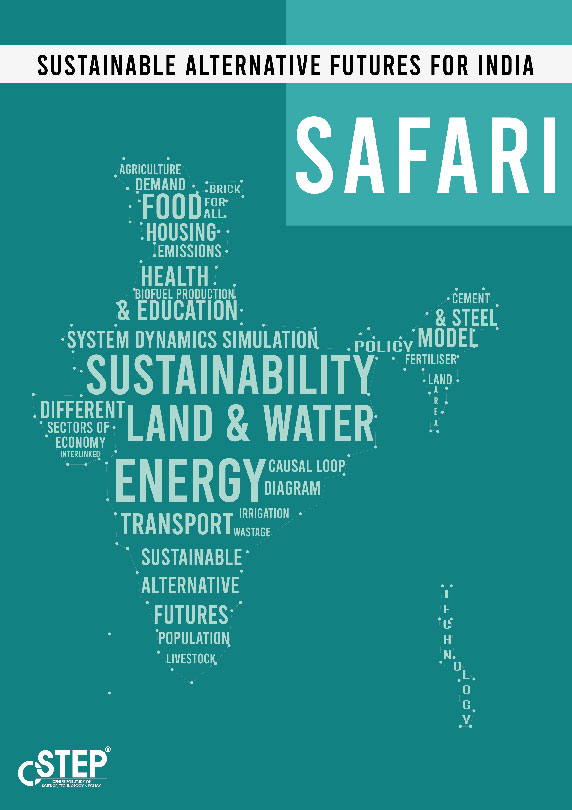Climate change mitigation involves strategies aimed at decreasing greenhouse gas emissions, promoting renewable energy sources, improving energy efficiency, and implementing sustainable practices. CSTEP focuses on building models to simulate India's future across sectors, such as transport, industries, buildings, agriculture, and forestry, to find interventions required to achieve a sustainable and secure future. Our work also involves the study of certain themes that cut across sectors (quality of life and development vs climate action, water and land demands for agriculture vs power, etc).
CSTEP's SAFARI model: Balancing development with climate action requires a good understanding of the interactions between sectors, natural resource systems, and environmental externalities. The Climate Change Mitigation at CSTEP has undertaken a modelling study with the aim to provide such an understanding and help create scenarios for low-carbon development through the use of an interactive simulation tool called Sustainable Alternative Futures for India (SAFARI). You can access the tool here.
SAFARI estimates the energy, emissions, and resources implications of achieving developmental goals such as food, housing, healthcare, education, power for all, and transport up to 2050. The user interface allows you to explore these implications as well as the trade-offs between them. Using SAFARI, you can create integrated scenarios across sectors and test out the impact of policy choices on energy, emissions, and resources. Ultimately, we hope that this tool can be used to provide insights into developing and tracking India's long-term strategy (LTS) in line with the Paris Agreement. For more information, please contact safari@cstep.in



Emission Inventory and Pollution Reduction Strategies for Bengaluru
Growing air pollution poses a serious health risk in India. The National Clean Air Programme (NCAP), was launched by the Ministry of Environment, Forest and Climate Change (MoEFCC) in 2019, with the target to reduce particulate matter concentration level by 20-30% in several non-attainment cities in India. These non-attainment cities do not meet the National Ambient Air Quality Standards (NAAQS). Bengaluru has been identified as one of the non-attainment cities of India under NCAP.
Going Smart With Energy Audit
The Indian power ministry recently mandated periodic energy accounting to reduce electricity losses for distribution companies (DISCOMs). This move will help identify areas of high transmission and distribution (T&D) losses and theft and enable corrective action. It will also provide detailed information about electricity consumption by different consumer categories and will make DISCOM officials accountable for any losses and/or thefts falling under their purview.
Financially Sound Utilities Are Imperative for Universal Access to Affordable and Clean Energy
Energy is central to almost every challenge we face today — security, climate change, food production, or job creation. Access to electricity brings concrete health benefits, besides an evident improvement in wellbeing. For the emerging economies in the Global South, universal access to energy can result in improvement in various areas. Among them are education, health, and productivity.
Looking at Sectoral Interdependencies
Risk, in the context of climate change, is a function of three factors — hazards, exposure, and vulnerability.
Moving Away from False-Positive Climate Risk Assessments
Nine months into 2021, and India, a country with a population of about 1.4 billion has already experienced two devastating cyclones, searing heatwaves, and disastrous floods resulting in the loss of hundreds of lives and destruction of crops and property.
Press Release - CSTEP Study: Western States Set for More High-Intensity Rainfall Events
A new study by the Center for Study of Science, Technology and Policy (CSTEP), a Bangalore-based think tank, emphasises the urgent need to build climate resilience in western India. Titled ‘District-Level Changes in Climate: Historical Climate and Climate Change Projections for the Western States of India,’ the study indicates changes in climate patterns that are likely to occur in the western states of India—Goa, Maharashtra, Gujarat, and Rajasthan—over the next three decades compared to the historical period (1990–2019).
Press Release - CSTEP Study: Madhya Pradesh & Chhattisgarh Set for Very High-intensity Rainfall Events Across All Districts
Changing climate patterns—from warmer summer maximum and winter minimum temperatures to heavier and more frequent rainfall and resulting extreme events—are to be expected across the states in Central India, according to a new study by the Center for Study of Science, Technology and Policy (CSTEP).
Press Release - CSTEP Study: Southern States of India Set for Warmer Winters, Heavier & More Frequent Rainfall
Changing climate patterns – from warmer summer maximum and winter minimum temperature to heavier and more frequent rainfall – are to be expected across all states in South India, according to a new study by the Center for Study of Science, Technology and Policy (CSTEP).
District-Level Changes in Climate: Historical Climate and Climate Change Projections for the Western States of India
The impacts of climate variability, climate change, and extreme events are visible globally and in India. The Global Climate Risk Index 2021 ranks India seventh, considering the extent to which India has been affected by the impacts of weather-related loss events (storms, floods, heatwaves, etc.). The index signals that repercussions of escalating climate change are exacerbating and can no longer be ignored.
District-Level Changes in Climate: Historical Climate and Climate Change Projections for the Central States of India
The impacts of climate variability, climate change, and extreme events are visible globally and in India. The Global Climate Risk Index 2021 ranks India seventh, considering the extent to which India has been affected by the impacts of weather-related loss events (storms, floods, heatwaves, etc.). The index signals that repercussions of escalating climate change are exacerbating and can no longer be ignored.